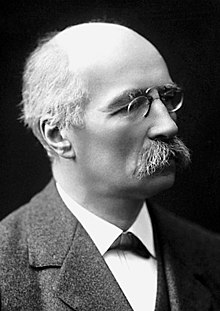Henri La Fontaine
Henri Marie La Fontaine [ lafɔ̃ˈtɛn ] (born April 22, 1854 in Brussels , † May 14, 1943 ibid) was a Belgian lawyer and politician . Henri La Fontaine founded the Belgian Society for Arbitration and Peace in 1883 with the help of the English pacifist Hodgson Pratt . He was the winner of the Nobel Peace Prize in 1913 and founded the Universal Library with Paul Otlet .
He should not be confused with the French general Henri Jean Lafontaine (1882–1966).
Work and life
Early years and education
Henri La Fontaine was born in Brussels in 1854 and grew up in very wealthy circumstances, as his parents belonged to the upper middle class. His school education took place in the Athenaeum in Brussels. After finishing school, he studied law at the Université Libre de Bruxelles . In 1877 he completed his doctorate , followed by internship with various practicing lawyers. He mainly dealt with questions of peacekeeping and published about it, which made him the target of criticism of several colleagues.
Peace activities
La Fontaine joined active peace work around 1880, from 1883 he worked together with the English pacifist Hodgson Pratt and became a pioneer of pacifist ideas through the joint establishment of the Society for Arbitration and Peace . From 1889, with the founding of the Permanent International Peace Office , the Inter-Parliamentary Union , the Second International and the first peace congresses, a wave of peace movements began in which La Fontaine took part. In the same year he was one of the founders of the Belgian section of the International Federation for Arbitration and Peace and was secretary general of the same until 1914. In 1894 he organized the Universal Peace Congress in Antwerp and from then on was considered one of the central figures of the Belgian peace movement.
Henri La Fontaine was an advocate of international arbitration with the creation of a world court as well as disarmament and the expansion of international legal certainty . In 1891 he was involved in the establishment of the Bureau International Permanent de la Paix (Permanent International Peace Office) in Rome and he took over the chairmanship as successor to Fredrik Bajer in 1907. He held this position until his death in 1943. In memory of his peace work, La Fontaine has been namesake for Fontaine Heights in Antarctica since 1959 .
He was also very active in Freemasonry and an honorary member of the General Masonic League, of which he was a member of the board.
Politics and college work
In 1895, Henri La Fontaine was elected to the Belgian Senate as a member of the Socialist Party, from which time he was a member with brief interruptions until 1936, where he was vice-president from 1919 to 1932. In 1922 he was accepted into the Council of the Interparliamentary Union, of which he had been a member since 1895, and became deputy chairman of the Peace Congress in Vienna . Until 1938 he took part in almost all important congresses and in 1935 he was chairman of the same in Bucharest . He was an advocate of international arbitration with the creation of a world court as well as disarmament and the expansion of international legal certainty .
In addition to his political work, Henri La Fontaine was a university lecturer and taught international law , private international law and economics at the University of Brussels from 1894 to 1914 . In 1907, together with Paul Otlet , he founded the universal library and a central office for the international societies, which became the Association of International Societies that still exists today . La Fontaine wanted to invest the money from the Nobel Peace Prize of 1913 in the founding of an "International City" that would serve as a world cultural center. The First World War thwarted this plan.
During the First World War he went to the United States and gave lectures there on internationalism and the League of Nations . After the war he became a delegate of the Belgian government to the peace conference and the League of Nations.
literature
- Bernhard Kupfer: Lexicon of Nobel Prize Winners , Patmos Verlag Düsseldorf 2001
- Literature by and about Henri La Fontaine in the catalog of the German National Library
Individual evidence
- ^ Article "Henri La Fontaine" in: Der Brockhaus Multimedial 2005 , Bibliographisches Institut & FA Brockhaus AG, Mannheim, 2005 ISBN 3-411-06519-2
- ↑ Eugen Lennhoff, Oskar Posner, Dieter A. Binder: Internationales Freemaurer Lexikon . 5th edition 2006, Herbig Verlag, ISBN 978-3-7766-2478-6 , p. 496
Web links
- Henri La Fontaine - biography
- Information from the Nobel Foundation on the award ceremony for Henri La Fontaine in 1913
| personal data | |
|---|---|
| SURNAME | La Fontaine, Henri |
| ALTERNATIVE NAMES | La Fontaine, Henri Marie (full name) |
| BRIEF DESCRIPTION | Belgian lawyer and politician |
| DATE OF BIRTH | April 22, 1854 |
| PLACE OF BIRTH | Brussels |
| DATE OF DEATH | May 14, 1943 |
| Place of death | Brussels |
